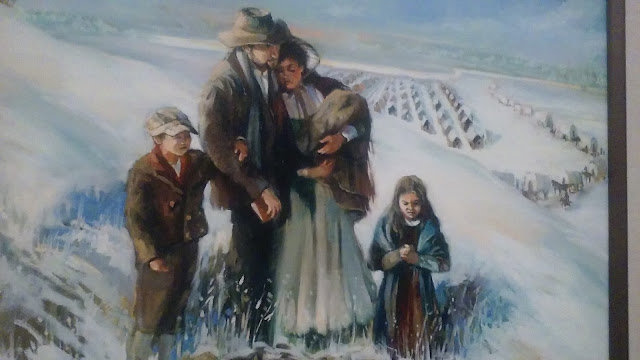Tuesday, May 16, 2017
"O Lord, we regard with intense and indescribable feelings the completion of this sacred house."
Wilford Woodruff, Dedicatory Prayer
The Salt Lake temple was the fourth temple to be completed in Utah, though it was started first. This picture, taken in 1893, shows the temple in its full glory, with Church leaders waiting outside to participate in the dedicatory services.
Thursday, April 20, 2017
You are a son or daughter of a loving Father in Heaven, and His love remains constant. I know that such reassuring feelings of love are difficult to recall when you are in the midst of personal struggles or trials, disappointments, or broken dreams.
Jesus Christ knows that fierce struggles and trials. He gave His life for us. His final hours were brutal, beyond anything we can even comprehend, but His sacrifice for each one of us was the ultimate expression of His pure love.
No mistake, sin, or choice will change God's love for us. That does not mean sinful conduct is condoned, nor does it remain our obligation to repent when sins are committed.
But we do forget, Heavenly Father knows an loves each of you and He is always ready to help.
Tuesday, April 4, 2017
My LAST WEEK in Omaha
Sisters Parsons and Chappell
Parsons, Chappell and me
Sister Neuberger
Sister Borla
Elders Towne and Brewster
Elders Boggess and Pacheco
Elder and Goodwin
Sisters and Orton
Sister Orton
Elder and Sister Gareis
Sister Preator
Sister Rook
twins - Shauna and Sis Cope
Vern
Sister Abbott
TWO pictures that I love from the Winter Quarters Vistor's Center
GO FORTH WITH COURAGE
IOWA MORMON TRAIL
In February 1846 the first group of exiled Latter-day Saints left Nauvoo, Illinois, for the Missouri River. Over the following seven months more than 12,000 Saints, some of them woefully unprepared made this first leg of the journey on their way to the Rocky Mountains.
THE GRAND EMCAMPMENT
In June 1846 the Saints established a temporary camp called "Grand Encampment," which eventually grew to about 10,000 residents. This wagon-and-tent city started three miles east of the Missiouri River and quickly stretched nine miles further east and three miles west to the banks of the river.
An additional fact: Winter Quarters area: Native Americans - The earliest people to inhabit the area now known as Council Bluffs were Native Americans of the Iowa and Oto Nations. By the mid-1840's the Native Americans who remained in the area were fragmented federations of the Pottawattamie, Chippewa, and Ottawa Nation. In 1847 the United States government moved the remaining Native Americans to "Indian Territory," in what is the state of Kansas.
"LO, WE HAVE LEFT ALL, AND FOLLOWED THEE." Luke 18:28
An additional fact: Winter Quarters area: Native Americans - The earliest people to inhabit the area now known as Council Bluffs were Native Americans of the Iowa and Oto Nations. By the mid-1840's the Native Americans who remained in the area were fragmented federations of the Pottawattamie, Chippewa, and Ottawa Nation. In 1847 the United States government moved the remaining Native Americans to "Indian Territory," in what is the state of Kansas.
"LO, WE HAVE LEFT ALL, AND FOLLOWED THEE." Luke 18:28
MORMON BATTALION
In July 1846 the US Army recruited men from Latter-day Saint camps in souothwestern Iowa to help secure California in the Mexican War. Many recruits were reluctant to serve a nation that had ignored their constitutional rights in Missouri and Illinois. Encouraged by Church leaders and sustained by their faith in God, however, nearly 500 men enlisted. These soldiers not only served their country, but their pay and uniform allowanced provided much-needed finances to the Church, which distributed the money to the soldiers' families and other on the trek to the Rocky Mountains.
Kanesville, Iowa -- 1852
Between 1946 and 1852 Kanesville served as the central gathering place for Latter-day Saint exiles. It also served as an important outfitting place for emigrants on their way to Oregon and California, as well as the Latter-day Saints headed for Utah. In 1852, the town boasted two newspapers, meetingplaces, and churches, hotels, restaurants, stores, and numerous other businesses. Originally called Miller's Hollow (after Bishop Henry Miller) and later called Council Bluffs, Kanesville was named after Thomas Kane, a lawyer from Pennsylvania, who in 1846 traveled to Miller's Hollow to meet with Church leaders.
Kanesville, Iowa -- 1852
Between 1946 and 1852 Kanesville served as the central gathering place for Latter-day Saint exiles. It also served as an important outfitting place for emigrants on their way to Oregon and California, as well as the Latter-day Saints headed for Utah. In 1852, the town boasted two newspapers, meetingplaces, and churches, hotels, restaurants, stores, and numerous other businesses. Originally called Miller's Hollow (after Bishop Henry Miller) and later called Council Bluffs, Kanesville was named after Thomas Kane, a lawyer from Pennsylvania, who in 1846 traveled to Miller's Hollow to meet with Church leaders.
Subscribe to:
Comments (Atom)



















































